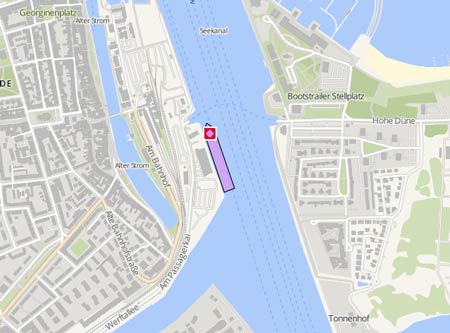ARANDA
Kurs/Position
vor 1 Min
Die letzten Häfen
Die letzten Wegpunkte
Die neuesten Nachrichten
Research ship investigates sunken tug
The 'Aranda' recently surveyed the southeast side of the Finnish island of Utö. A preliminary investigation of the tug 'Simson', which sank in 1978, is underway for a possible oil removal operation. The Finnish Environment Institute was responsible for the investigation of this possibly high-risk shipwreck southeast of Utö, close to the Archipelago National Park. The 'Simson' was built in 1915 and still in use in the 1970s. The vessel was overhauled in 1971 and sank in 1978, and the wreck is estimated to contain 25,000 litres of light fuel oil. The aim of the investigation was to 3D model the wreck for further operations and to find out how it could be drained of oil. The wreck lies partially sunk in the mud at a depth of about 60 metres, and working at this depth poses some challenges. The modelling will be carried out using the hydroacoustic equipment of the marine research vessel and imaging obtained using an ROV diving robot. The wreck is located close to a nature reserve. If it were to start leaking oil, in average winds the oil would drift towards the Finnish coast and the Archipelago National Park. If a spillage operation is decided upon, it will be put out to tender and carried out during 2023. The investigation of the 'Simson' is part of a programme launched by the Ministry of the Environment of Finland to improve water protection in 2019–2023. Four wrecks have so far been renovated as part of the project to investigate the possibilities for wreck renovation: the dredger Veli off Hanko, the dry cargo vessels Hanna-Marjut and Fortuna on the Kihti Gulf, and the motor vessel Beatris in the sea area of Iniö. The responsible organization for the project is SYKE, with the participation of the Finnish Navy and the Finnish Border Guard. Report with photos: https://www.hydro-international.com/content/news/investigation-of-a-possible-high-risk-shipwreck-in-finnish-waters
Russia intercepted Finnish research vessel in international waters
Russian military ships have twice recently intercepted the "Aranada" in international waters in the Baltic Sea, the the Finnish Environment Institute said on Oct 11, 2014. A Russian warship ordered the "Aranda" to change course east off the Swedish island of Gotland on Aug. 2, 2014, through radio contact. It obeyed the first but ignored the second request, and later noticed a submarine nearby. In September, a Russian helicopter and a military ship passed the vessel very close. The crew and Swedish researchers onboard considered the incident as threatening. In neither case did the Aranda change its course or speed and continued its research into marine samples in the area. Finland's foreign ministry said it was concerned by the preliminary information it had received about the incidents and that Finnish defence forces were investigating.
Research ship ARANDA investigates Baltic Sea radiation levels
The maritime research vessel Aranda on Saturday started a voyage aimed at determining the condition of waters in the eastern Gulf of Finland. Levels of radiation, oxygen and marine life at the sea floor of the Gulf will be examined in both Finnish and Russian territorial waters. Algae toxins and nutrient concentrations will also be monitored. Aranda set sail from the port of Kotka on Saturday. The Finnish Environmental Institute’s research vessel will also call in at St. Petersburg for a public exhibition of its work. The Baltic is the most radioactive sea in the world. Most radiation has seeped into the sediment at the floor of the sea. The largest single dose resulted from the aftermath of the Chernobyl nuclear disaster 25 years ago.
News schreiben

